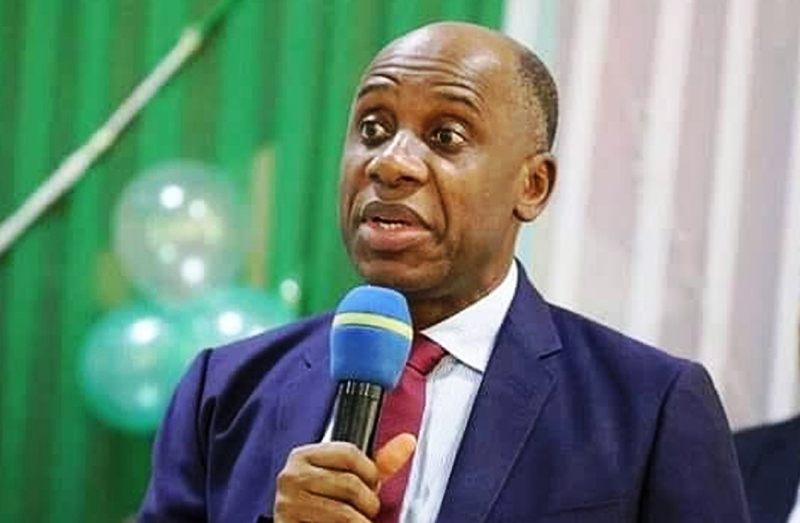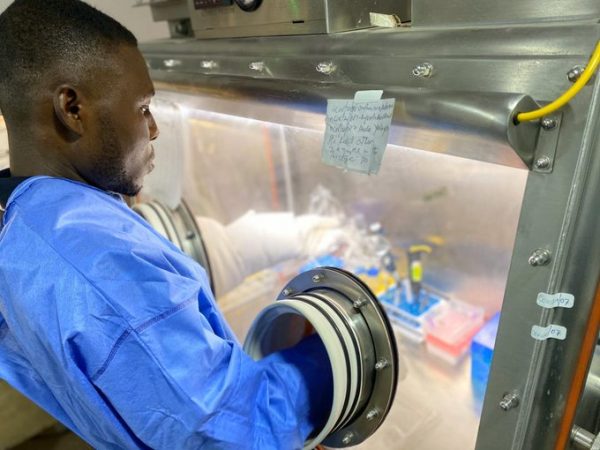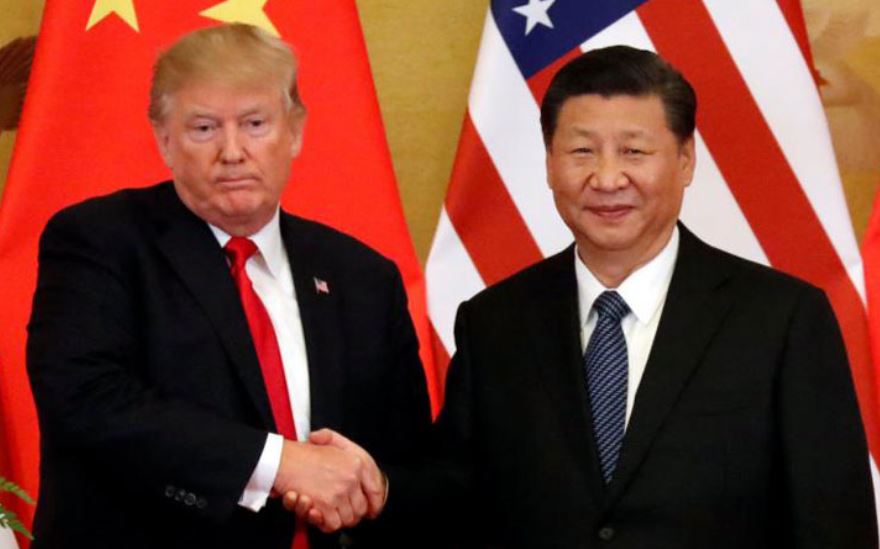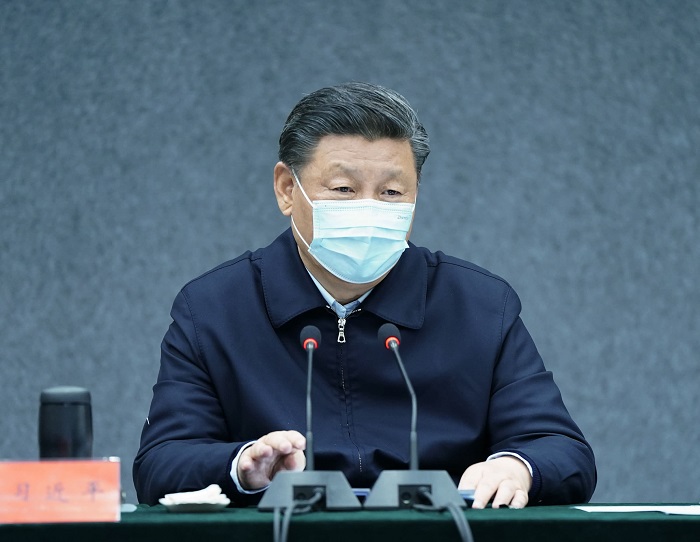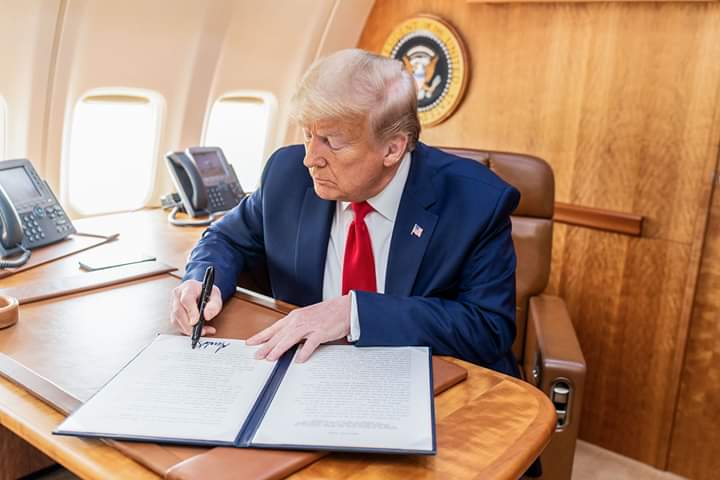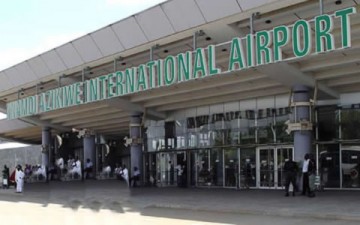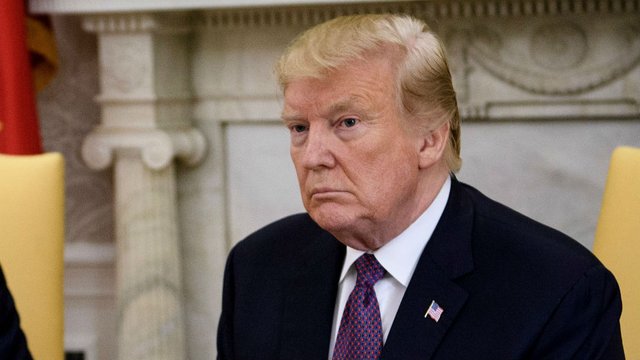The Debt Management Office (DMO) has released the details of the status of loans Nigeria obtained from the Export-Import (EXIM) Bank of China as at March 31, 2020.
The projects listed in the document released by DMO are the Nigerian National Public Security Communication system Project, the Nigerian Railway Modernization Project (Idu- Kaduna section) and Abuja Light Rail Project.
Others are the Nigerian ICT Infrastructure Backbone Project, Nigerian Four Airport Terminal 5 Expansion Project (Abuja, Kano, Lagos & Port Hacourt), Nigerian Zungeru Hydroelectric Power Project, and Nigerian 40 Parboiled Rice 7 Processing Plants Project (Fed. Min. of Agric & Rural Dev.)
More are the Nigerian Railway Modernization Project (Lagos Ibadan section), Nigeria Rehabilitation and 9 Upgrading of Abuja – Keffi Makurdi Road. Project, Nigeria Supply of Rolling Stocks and 10 Depot Equipment for Abuja Light Rail Project and Nigeria Greater Abuja Water Supply Project.
According to the release, a total of USD3 billion has been released by the EXIM Bank of China to Nigeria. However, it showed that no amount has been disbursed for Nigerian 40 Parboiled Rice 7 Processing Plants Project (Fed. Min. of Agric & Rural Dev.), Nigeria Supply of Rolling Stocks and 10 Depot Equipment for Abuja Light Rail Project and Nigeria Greater Abuja Water Supply Project.
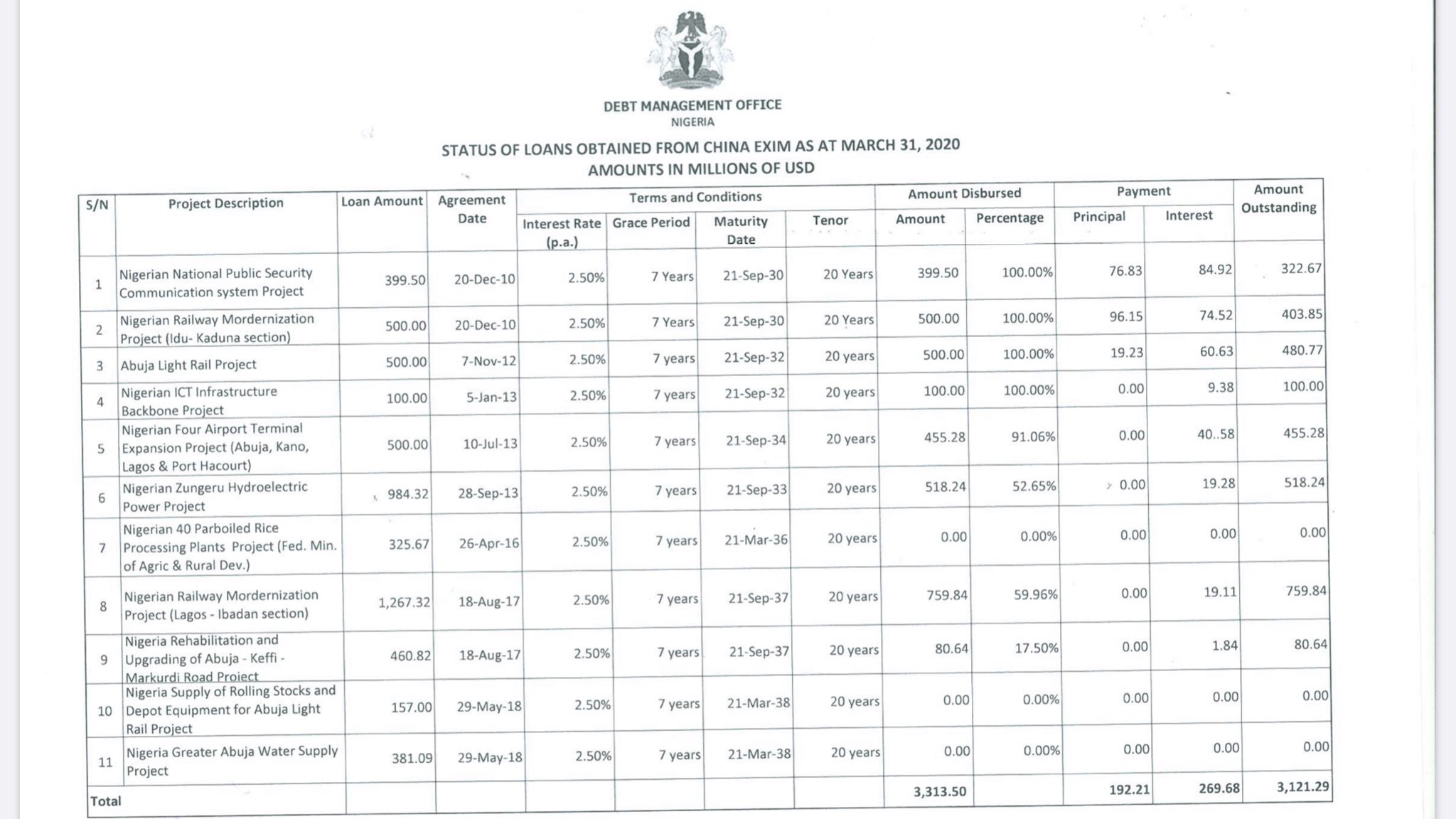
Meanwhile, the Minister of Transportation, Rotimi Amaechi says Nigerian government has the capability to pay back loans collected for the construction of rail projects within the stipulated period of 20 years.
Amaechi, in a statement on Saturday, said China was the only country giving out loans with a low interest rate of 2.8 per cent.
He said no country in the world would give out a loan without a guarantee to pay back such loans.
“The trade agreement between Nigeria and China, the ministry of transportation does not take loan, everything about loan is directed to the Ministry of Finance, so, I couldn’t have signed any loan because I don’t take loan.
“What I signed is what is called commercial contract, which is contract between the Federal Government and CCECC as a contractor, the contract between Nigeria and China is usually signed by the ministry of finance.
“Whether is the ministry of finance that signed it or the ministry of transportation, the issue is that nobody will give you loan free of charge.
“There must be an agreement and such agreement must contain some terms, that doesn’t mean that you are signing away the sovereignty of the country, no country will sign out its sovereignty.
“What clause 8 says is, I expect you to pay according to those terms we have agreed, if you don’t pay, don’t throw your immunity on me when I come to collect back the guarantee that was put forward, that is all.
“We are paying the loans. In the same National Assembly sitting, they were told that of the 500million dollars loan, we have paid 96 million dollars already, Nigeria is already paying.
“And the 500 million dollars was not taken by us, it was taken by President Goodluck Jonathan in his term and that clause was there.
“Nigeria has the capacity to pay back for the period of 20 years at 2.8 per cent, which country will give you that loan? Secondly, these loans are not given to us, they are paid directly to the contractors.
“Once they sign that the job has been done, they pay the contractors and that has never happened before and this project are in place. Are they trying to rubbish the fact that there is a railway from Abuja-Kaduna?
“There is no loan in Nigeria, either internal or external that is not approved by the National Assembly, none.
“Chinese government will not even give you a loan without an approval by the National Assembly because if they give you a loan without the approval from NASS that is no loan,” Amaechi explained.
The minister further said the government needed the loans to boost infrastructure in the country.
According to him, the sovereign guarantee and sovereign immunity clause raised by the NASS is a term used to ensure that loans collected are paid back.
The minister said in the case of a default, only the assets constructed with such a loan would be taken back.
He said: “What you do is you give a sovereign guarantee and that guarantee is the immunity clause they are talking about.
“When we say, I give you a sovereign guarantee and we get immunity clause, the immunity clause is that, if tomorrow I am not able to pay and you come to collect the items we have agreed upon, that these are the items that am putting down as guarantee, I can waive my immunity and say no you can’t touch it am sovereign country.
“So, they are saying, if you are not able to pay, don’t stop us from taking back those items that will make us recover our funds. So, is China our father that will give us money for free?
“It is a standard clause in every agreement whether is America we signed it with, whether is Britain, any country would want to know that they can recover their money.
“Anybody that is saying he doesn’t know what a sovereign guarantee or immunity is, too bad for the person, because it simply means in trade that I am not giving you this loan free of charge.
“Just like you go to the bank to collect a loan, the moment you don’t pay they go after your assets you put down, that is all about the clause, the Chinese can never come and take over Aso rock and become President or Minister.
”And if the assets you put down become depreciated then you negotiate which assets they can go after. Chinese will never take over what was not constructed with the loan.”
Amaechi noted that it would be unconstitutional to take a loan not approved by the NASS, but for confidentiality in government he would have published the clauses generating the dusts.
The minister while asking the reason for the investigation by the NASS added that they were aware of all the loans.
He said:” The Chinese is just asking us to show them the evidence that we will pay back, which is the immunity clause. If we don’t pay, they can take back their assets.”
On the Zambia experience, where the country could not meet up with its loan agreement, the minister said that the Chinese government will never take over infrastructure that was not constructed from the money taken.
He also acknowledged that the finance ministry in a payment plan had started paying back some of the loans collected.
He said the payment plan was the responsibility of the ministry of finance, and the Ministry of transportation was supposed to implement the contract.
“They are meeting the requirements, at any point in time that we need to pay, we’ll pay. 1.6 billion dollars was taken to fix Lagos to Ibadan, we are asking for 5.3 billion dollars to fix from Ibadan to Kano.
“3.2 billion dollars to fix Port Harcourt to Maiduguri, then Lagos to Calabar which is about 11.1billion dollars, if those things were done when we had money, the infrastructure will be here today? The answer is no,” Amaechi added.
The minister, however, called on the National Assembly and Nigerians to appreciate government effort in providing infrastructure in the country.
Amaechi noted that the Itakpe/Warri rail project in the South South, which was abandoned for thirty four years by successive governments was fully rehabilitated by the present administration without seeking for loan.
